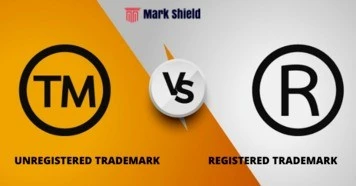Trademark – Mark your territory!
A Trademark is a word, expression, image, or even a design plan that recognizes and distinguishes the products of one enterprise from those of others. A service mark whereas, is a word, expression, image, and additionally a design that recognizes and separates the source of a service rather than a product. A few models incorporate brand names, mottos, and logos. The expression “Trademark” is frequently utilized from an overall perspective to include both Trademarks and Service Marks.
Unlike license, Patents and copyrights, Trademarks don’t get expired following a set term of years. In this manner, a Trademark can keep going perpetually – for as long you keep on utilizing the imprint or mark in business to show the source of products and ventures and services. A Trademark enrollment or registration can likewise keep existing forever, provided that you file and record specific documents and pay charges at regular intervals.
The owner of a Trademark can take a legal action against somebody who uses his trademark without his permission. This is called Trademark Infringement. Most nations require formal enlistment or registration of a Trademark as a precondition for seeking after this kind of legal action. The United States, Canada and different nations additionally also recognize common law Trademarks rights, which means an action can be taken to secure or protect an unregistered Trademark on the off chance that it is being used by somebody else. Still, common law Trademarks offer to the holder, in general, less legal assistance than the registered Trademarks.

Types of Trademark Laws:
In order to serve as a trademark an imprint must be distinctive and unique – that is, it must be fit for distinguishing and recognizing the product of a particular brand. In deciding if an imprint or a mark is unique, the court’s bunch marks into four classifications, based on the connection between the imprint and the actual product: (1) arbitrary or fanciful (2) suggestive, (3) descriptive, or (4) generic. Since the imprints in every one of these classes vary according to their uniqueness, the necessities and requirements for, and the level of, legal protection provided for a specific Trademark will depend on which classification it falls under.
- An arbitrary or fanciful mark is an imprint or a mark that bears no logical relationship to the actual item. For instance, the words “Exxon,” “Kodak,” and “Apple” bear no actual deep relationship to their basic items (separately, gas, cameras, or PCs). Also, the Nike “swoosh” bears no inborn relationship to athletic shoes. Arbitrary or fanciful imprints and designs are completely unique – which means that they are fit for distinguishing and recognizing a basic item – and are given a high level of insurance.
- A suggestive imprint or mark is an imprint that inspires or evokes and suggests an attribute of the underlying good. For instance, “Coppertone” is suggestive name of sun-tan moisturizer, yet it doesn’t explicitly describe the fundamental item. A person has to be imaginative and creative in some way to connect the name of the brand to the product. Simultaneously, however, the word isn’t absolutely disconnected to the fundamental product. Like Arbitrary and fanciful imprints, suggestive imprints are intrinsically particular and are given a high level of legal protection.
- A descriptive imprint is an imprint that directly portrays a characteristic or nature of the fundamental product or service (for example its tone, smell, capacity, measurements, or ingredients, color etc.). For instance, “Holiday Inn,” “All Bran,” and “Vision Center” all describe some part of the actual product and service. (respectively, lodgings, breakfast oat, optical services). They tell us something about the item. Unlike arbitrary or suggestive marks, descriptive marks are not intrinsically distinctive and are secured and protected only if they have obtained “secondary meaning.” Descriptive imprints should face this extra obstacle since they are terms that are valuable for describing the fundamental item or product, and giving a specific producer or a manufacturer the exclusive right to utilize the term could confer an unfair advantage. A descriptive mark acquires secondary meaning when the consuming public primarily associates that mark with a particular producer, rather than the underlying product.
- A generic imprint is an imprint that portrays and describes the overall class to which the hidden item has a place. For instance, the expression “Computer” is a nonexclusive generic term for all computers. Conventional or generic imprints are not qualified for any type of security under Trademark law. Hence, a manufacturer selling “PC” brand computers (or “Apple” brand apples, and so on) would have no exclusive right to utilize that term regarding that item. Generic terms are not secured by Trademark law since they are basically excessively helpful for distinguishing a specific item. Giving a solitary producer command over utilization of the term would give that maker too great an upper hand and advantage over others. Under certain conditions, terms that are not initially generic can get generic after some time (a cycle called “genericity”), and in this way become unprotected.
Registration of Trademark:
According to section 18 (1) of the Trade mark Act, 1999, any individual professing to be the owner of a Trademark utilized or proposed to be utilized by him may apply in writing as a hard copy in the recommended way for registration. The application must contain the name of the imprint or mark, products and services, class in which goods and services fall, name and address of the applicant, time of utilization of the imprint or mark. Here an individual means a Partnership firm, association of persons, a company, whether incorporated or not, a Trust, Central or State government.
Benefits of trademark:
- Exclusivity: a trademark registration gives its proprietor exclusive ownership in the Register of trademarks and exclusive rights to utilize the trademark in India.
- Proof of validity: during legal procedures, the trademark’s enlistment is the by all appearances proof of its legitimacy
- Border protection: for requirement against infringing merchandise at the border, a trademark must be enrolled in the Register just as with the customs authority in India.
- Infringement action: the owner or registered client of the enlisted trademark can carry infringement procedures against any clashing imprint in India. Further, the burden of proof of probability of consumer confusion is assumed, and released from the proprietor in infringement actions.
- Security: registered trademarks can be used as security to avail loans similar to immovable properties.
However though, trademark registration under the Indian Act just has impact in India. To get trademark rights and security in different nations it is important to utilize and additionally register the trademark in those countries too. Trademark is all about territory in nature. A different registration should be made in every one of the nations where protection is wanted. To acquire security outside India, it is important to file applications in the desired nations exclusively. Furthermore, you should be mindful so as to apply for registration in a nation before you start utilization of your trademark in that nation. In certain nations, for example, Continental Europe, China, Japan and Indonesia, the first individual to apply for registration will be given the rights to a trademark, instead of the individual who first uses the trademark. Therefore, it is very possible for another person to legally and authentically steal your trademark by applying for registration regardless of whether you were the first individual to utilize the trademark or not.
Trademark
Aenean auctor wisi et urna. Aliquam erat volutpat. Duis ac turpis. Integer rutrum ante eu lacus. Vestibulum libero nisl.





